Understanding Rabbit Chew Spray: Essential Insights for Pet Owners
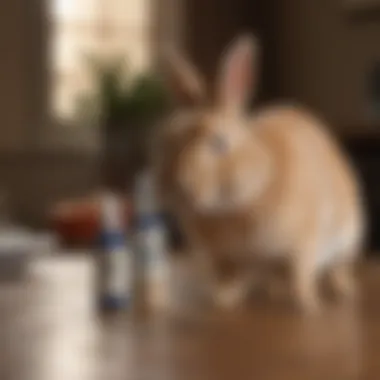
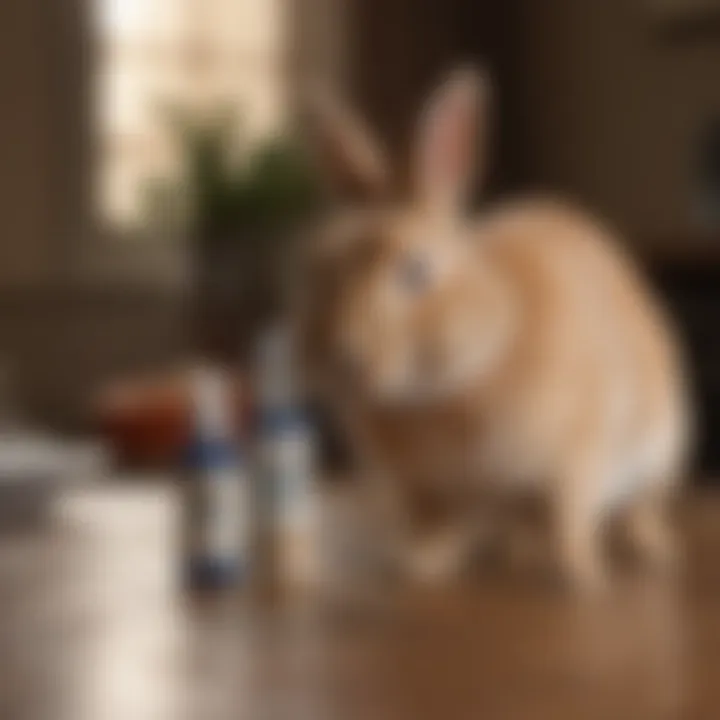
Intro
Understanding the nuances of rabbit care is essential for any pet owner. One aspect often overlooked is the chewing behavior of rabbits. This can lead to damaged furniture and belongings in a home. Many pet owners find themselves caught in the dilemma of keeping their little companions healthy while protecting their possessions.
In this guide, we will explore rabbit chew spray, a useful tool designed to deter unwanted chewing, as well as other practical strategies for managing this behavior. With a good grasp of your rabbit’s needs and how to address chewing, you can create a safe and harmonious home environment. Let's delve into this topic in detail.
Understanding Your Pet
Pet Behavior Basics
Rabbits, by nature, are curious creatures. Their inquisitiveness often leads them to chew on various objects around the house. Chewing is not just a pastime; it is part of their instinct to keep their teeth healthy. In the wild, rabbits constantly grind their teeth against natural materials. Understanding this behavior is key for any pet owner.
Common Breed Characteristics
Different rabbit breeds exhibit varying chewing habits. Larger breeds, like the Flemish Giant, tend to have stronger chewing instincts due to their size. On the other hand, smaller breeds, such as the Netherland Dwarf, may not have the same aggressive tendencies. Recognizing these characteristics can help in preventing damage to household items.
Species-Specific Needs
Every rabbit has individual needs. For example, some may prefer certain types of wood to chew on. Providing appropriate chew toys can mitigate unwanted chewing. The right chew toys not only satisfy the rabbit's need to chew but also encourage healthy dental habits.
Pet Care and Maintenance
Feeding Guidelines
A balanced diet is crucial for a rabbit's overall health. High-fiber hay, fresh vegetables, and limited pellets should form the basis of their diet. A well-fed rabbit is less likely to resort to chewing inappropriate items in search of nutrients.
Grooming Essentials
Routine grooming helps keep your rabbit’s coat healthy. Regular brushing minimizes shedding and helps you check for any abnormalities. A healthy coat reduces stress, which can also influence chewing behavior.
Hygiene Practices
Maintaining cleanliness in your rabbit's environment promotes their health. Clean litter boxes daily and regularly sanitize their space. A clean area contributes to a happier rabbit, reducing tendencies to chew out of boredom or distress.
Training and Development
Basic Commands and Skills
Teaching basic commands can help in managing chewing habits. Simple commands such as
Prelims to Rabbit Chew Spray
Rabbit chew sprays are becoming essential for pet owners who seek to maintain both their home's integrity and their pet's health. With the natural instincts of rabbits driving them to chew on a variety of objects, pet owners are often left with damaged furniture and belongings. Therefore, understanding rabbit chew spray is critical for creating a harmonious environment. Chew sprays serve a dual purpose; they discourage destructive behaviors while ensuring your rabbit remains healthy and happy.
Defining Chew Spray
Chew spray is a specially formulated product designed to deter rabbits from chewing on prohibited surfaces, such as furniture or electrical cords. These sprays typically contain bitter-tasting substances that discourage chewing due to their unpleasant flavor. Furthermore, they are often made with safe ingredients that do not pose a risk to the rabbit's health. The primary function of chew spray is behavioral modification, guiding the rabbit's natural instinct to chew towards more appropriate items like toys or hay.
Purpose of Chew Spray in Rabbit Care
The use of chew spray plays a significant role in rabbit care. First, it helps protect household items from being damaged. Rabbits are known to chew on anything that piques their interest, and without intervention, this can lead to costly repairs or replacements. Second, chew sprays contribute to maintaining a safe environment for rabbits. Some household items can be toxic if ingested. Chew spray can act as a preventative measure, reducing the chances of a rabbit consuming harmful materials. Finally, using chew spray can foster a more peaceful coexistence between rabbits and their owners. This harmony can promote better behavior and a closer bond between the pet and owner.
Composition of Rabbit Chew Spray
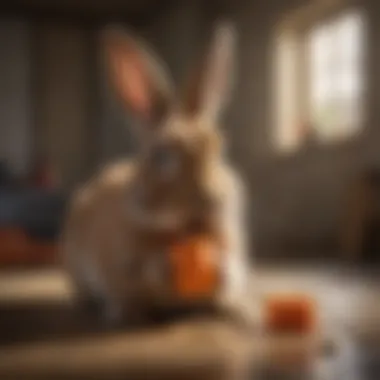
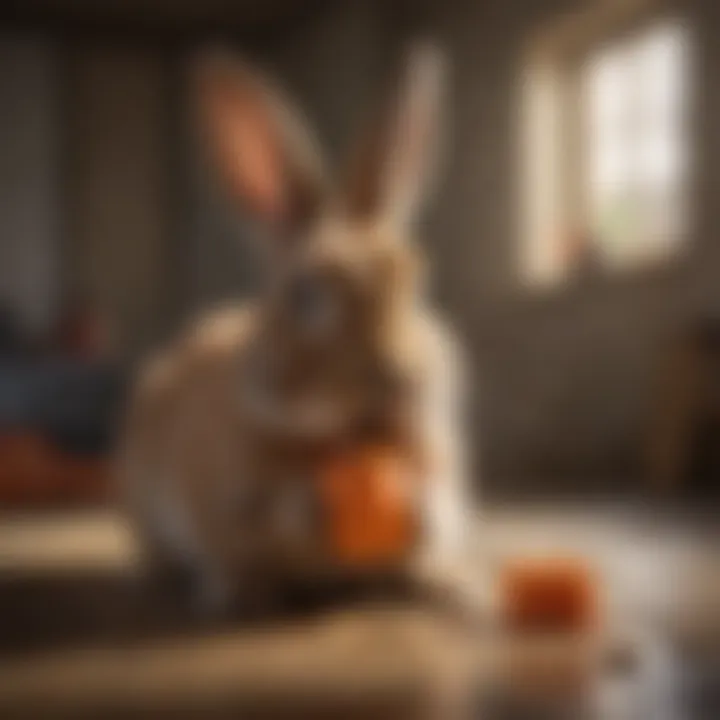
Understanding the composition of rabbit chew spray is vital for pet owners. It shapes how effective the product will be in managing chewing behaviors. Additionally, knowing what ingredients are in the spray can help owners make informed choices for their rabbits’ safety and well-being.
Ingredients Found in Chew Sprays
Rabbit chew sprays typically contain a blend of active and inactive ingredients. Common active ingredients are often bitter substances designed to deter chewing. Some widely used ingredients include:
- Bitter Apple: Known for its unpleasant taste to pets, making it a popular choice.
- Bitter Orange: This ingredient is similar in purpose to Bitter Apple but may have a different flavor profile.
- Cayenne Pepper: Provides a strong taste that can discourage chewing on furniture or other items.
- Natural Oils: Some formulations use plant-based oils to achieve a bitter flavor while being safer for rabbits.
It's also crucial to consider the base of the spray. Many products use water or alcohol, but alcohol-based sprays can be harmful to rabbits. Always check what is used as a base, as it can impact both effectiveness and safety.
Safety Considerations for Ingredients
When selecting a rabbit chew spray, safety is paramount. Not all ingredients are suitable for every rabbit. Here are some essential safety considerations for pet owners:
- Avoid Toxic Ingredients: Some compounds can be harmful to rabbits. Check for any toxic substances. If uncertain, research or consult a veterinarian about any unfamiliar ingredients.
- Sensitivity to Taste: Rabbits may vary in their sensitivity to certain flavors. An ingredient that deters one rabbit may not impact another. Monitoring your rabbit's reaction is essential.
- Non-Irritating Formulas: Consider sprays that claim to be non-irritating. Rabbits have sensitive skin, and formulations that are too harsh may cause irritation.
- Natural vs. Synthetic: When possible, opt for products with natural ingredients. These are generally safer for rabbits and align better with their health needs.
Always consult with a veterinarian before introducing any new product to your pet's environment.
Ultimately, understanding the composition of rabbit chew spray allows pet owners to choose wisely. This knowledge can help protect both household belongings and the health of their rabbits.
Effectiveness of Rabbit Chew Spray
How Chew Spray Works
Rabbit chew sprays primarily act as deterrents that discourage rabbits from chewing on furniture and other destructive behaviors. The active ingredients in these sprays typically include bitter substances that create an unpleasant taste. When a rabbit encounters these sprays on surfaces, the immediate reaction is often to recoil rather than continue chewing. Understanding this mechanism is crucial for pet owners looking to protect their belongings while maintaining a safe environment for their pets.
The application of chew spray is quite straightforward. Pet owners generally need to apply the solution on the areas they wish to protect. It is important to ensure that the surfaces are clean and dry before application. Consistency is also key. Multiple applications may be necessary to reinforce the deterrent effect.
Factors Influencing Effectiveness
The effectiveness of rabbit chew spray can depend on several factors. A few notable influences include:
- Type of Ingredients: The quality and type of active ingredients can greatly affect how well the spray deters chewing behavior. Different rabbits may have varying reactions to the same substance.
- Rabbit's Individual Behavior: Each rabbit has a unique personality and chewing habits. Some may be more sensitive to the taste or smell than others, which can affect how well they respond to the spray.
- Frequency of Application: Regularly reapplying the spray is vital. If the scent fades or the rabbit becomes desensitized to the taste, the spray's effectiveness will diminish.
- Surface Material: The texture and material of the surface being sprayed can influence how well the spray adheres and functions. Smooth surfaces may require more effort to keep the spray effective over time.
Consistent application alongside understanding your rabbit's behavior can make chew sprays significantly more effective.
When choosing a chew spray, pet owners should consider these factors to maximize the product's benefits. By being attentive to their rabbit's responses and the context of use, it is possible to achieve a favorable balance between reducing destructive behavior and ensuring the health of their pet.
Alternatives to Rabbit Chew Spray
For pet owners, managing a rabbit's chewing habits can be challenging. While rabbit chew sprays are a popular solution, alternatives do exist. Exploring these alternatives is crucial because they can also promote the rabbit's health and well-being. Each alternative has its pros and cons, which can be tailored to individual rabbit needs.
Natural Alternatives
Natural options for curbing rabbit chewing behaviors often focus on providing safe, enticing alternatives. These methods not only prevent unwanted chewing but also cater to a rabbit's natural instincts.
- Timothy Hay: This hay variety offers rabbits a satisfying texture and taste. Chewing on it can help satisfy their need to gnaw while providing essential nutrients.
- Chew Toys: Wooden chew toys made from untreated wood species like aspen or willow are ideal. They allow rabbits to chew without harming themselves or household items.
- Cardboard and Paper: Give your rabbit cardboard boxes or paper tubes. They can shred and chew them safely, promoting dental health and engaging their curiosity. It's a fun way to direct their chewing energy.
Natural alternatives can enhance the environment for the rabbit. Ensuring a play area filled with these safe options can help redirect their chewing habits away from your furniture.
Behavioral Training Techniques
Behavioral training is another effective approach when addressing a rabbit's chewing tendencies. Understanding and modifying behavior can help rabbits learn which items are appropriate to chew.
- Positive Reinforcement: Rewarding your rabbit with treats or affection when they chew acceptable items can be powerful. This helps them associate good behavior with positive outcomes.
- Setting Boundaries: Designate specific areas for chewing. If a rabbit has a known spot, they can be trained to go there when they feel like chewing.
- Distraction: When observing a rabbit about to chew on an inappropriate item, redirect them to an approved chew toy or natural alternative.


By practicing these techniques consistently, owners can cultivate a healthier relationship between their pets and their belongings. Behavior modification takes time but can be very rewarding for both owner and pet.
Remember: Training sessions should be short and enjoyable for the rabbit. A stressed rabbit may not respond well.
Using these alternatives can provide pet owners with varied strategies to manage chewing behavior. They reflect a commitment to the rabbit's health without solely relying on a spray. Incorporating natural products and behavioral adjustments can create a harmonious living space for both the pet and its owner.
Choosing the Right Rabbit Chew Spray
Choosing the right rabbit chew spray is a critical step for pet owners seeking to maintain their home environment while ensuring the well-being of their furry companions. A proper chew spray can protect furniture and personal items from being chewed on, yet it also is essential to select a product that is safe for the rabbit. Navigating the myriad choices available requires a discerning eye and an understanding of the components that make for an effective spray.
Evaluating Product Labels
When evaluating product labels for rabbit chew sprays, several key factors should be taken into account. A transparent ingredient list is essential. Pet owners should look for natural or organic ingredients which typically indicate a lower risk of harming the rabbit. The absence of alcohol, toxins, or artificial additives is non-negotiable. Reading labels can reveal whether the formulation has been veterinary-approved or tested for safety, which is another positive sign.
Additionally, one should check for specific benefits highlighted on the label. Some sprays are designed to deter chewing specifically, while others may serve multiple purposes, such as promoting dental health. Consider also the concentration and potency of the active ingredients, which can influence how effective the spray will be in discouraging unwanted chewing behaviors.
Here are some aspects to consider when evaluating product labels:
- Ingredient Transparency: Are all ingredients listed without vague terms?
- Safety Certifications: Does the product have any endorsements or certifications from veterinary bodies?
- Purpose Clarity: Does the product state its intended effect clearly?
- User Reviews: What do other pet owners say about the product’s effectiveness?
Top Brands and Their Offerings
Several brands have emerged as leaders in the rabbit chew spray market, known for their commitment to quality and safety. Each brand offers a unique formulation designed to cater to the distinct needs of rabbits and their owners.
One prominent brand is Bunny Chew Safe, featuring a formula made from all-natural ingredients, making it a popular choice among conscientious pet owners. Another reputable option is Binky Buddy, known for its effective deterrents and positive user feedback. Their product emphasizes both efficiency and the absence of harmful chemicals, making it safe for rabbits.
When reviewing these brands, consider the following:
- Reputation of the Brand: Does the brand have a history of producing quality pet products?
- User Recommendations: Are they frequently cited in forums like Reddit or Facebook groups?
- Variety of Offerings: Does the brand provide multiple options that cater to specific needs?
Application of Rabbit Chew Spray
The application of rabbit chew spray is a crucial topic within the realm of responsible pet ownership. It directly influences not only the behavior of the rabbit but also the welfare of the surrounding environment. Effective application can protect furniture, prevent unwanted chewing, and promote healthy habits in rabbits. An understanding of best practices and the frequency of application can enhance the success of chew sprays, making them a valuable tool for pet owners.
Best Practices for Application
When applying rabbit chew spray, some best practices need to be followed to maximize its effectiveness. Here are several points to consider:
- Choose the Right Area: Apply the spray in places where the rabbit often chews inappropriate items. This could be furniture legs or certain corners of your home.
- Clean the Surface: Ensure the targeted surface is clean and dry. Dirt or residues can affect the adhesion of the chew spray.
- Apply Evenly: Use the nozzle to spray evenly over the surface. Uneven application may lead to areas of ineffective deterrence.
- Test Before Full Application: Start with a small area to make sure your rabbit does not react negatively to the spray. Monitor the rabbit’s behavior closely after application.
- Avoid Direct Contact: Keep the spray away from the rabbit itself. It is designed for surfaces, not for direct consumption.
Following these practices not only enhances the effectiveness of the chew spray but also ensures the safety and well-being of the rabbit.
Frequency of Application
The frequency of application is an essential aspect to consider when using rabbit chew spray. If applied too often, it may irritate surfaces or become ineffective. Here are some guidelines for determining the right application frequency:
- Initial Phase: During the first few weeks, applications may need to be more frequent, generally every two to three days, until the rabbit starts showing resistance to unwanted chewing.
- After Assessment: Once the rabbit begins to change its chewing habits, you can reduce the frequency to once a week. Monitor the effectiveness closely.
- Seasonal Changes: Factors such as humidity and temperature can affect both the rabbit's chewing behavior and the longevity of the spray on surfaces. Adjust the frequency accordingly.
- Reapply after Cleaning: If the surface is cleaned, the chew spray should be reapplied to ensure continued effectiveness.
In summary, finding the right application strategy and frequency is vital for achieving the desired results with rabbit chew spray. Assess your rabbit's behavior frequently to ensure the approach is effective.
Monitoring Rabbit Behavior Post-Application
Monitoring your rabbit's behavior post-application of chew spray is crucial for several reasons. It's not just about ensuring the spray is effective, but also about safeguarding your pet's overall well-being. Observing changes in behavior allows pet owners to assess how their rabbit reacts to the chew spray, providing insights into both its effectiveness and any potential side effects.
By keeping an eye on your rabbit, you can determine if the chew spray is performing its intended function of discouraging chewing on furniture or other items. At the same time, careful observation helps identify how comfortable and stress-free your rabbit feels in their environment. Behavioral monitoring can highlight any notable trends or issues that may arise as a direct response to the spray.

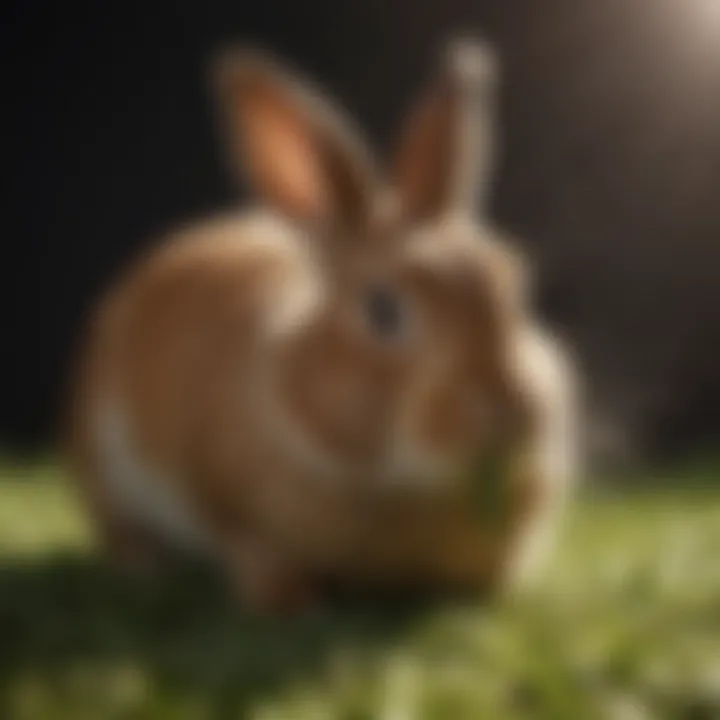
Signs of Effectiveness
Determining if the chew spray is effective involves looking for specific signs in your rabbit's behavior. Here are some indicators:
- Reduced Chewing: The most obvious sign is a noticeable decrease in chewing on undesirable objects such as wires, furniture, or walls.
- Calm Demeanor: If your rabbit appears more relaxed in spaces where it previously chewed excessively, this may indicate the spray's impact.
- Exploration of Alternatives: Look to see if your rabbit is redirecting its chewing habits to safe chewable items, such as approved toys or treats.
It is essential to note that some rabbits may take time to adjust to the spray. Therefore, a patience is necessary while assessing its effects.
Recognizing Unintended Reactions
While chew sprays are designed for the benefit of both the rabbit and the home environment, unforeseen reactions can occur. Identifying these reactions is equally important. Watch for the following signs:
- Increased Anxiety: If your rabbit seems more agitated or fearful after the application, it may be reacting negatively to the spray.
- Gastrointestinal Distress: Monitor for any changes in eating or defecation habits. Loss of appetite or signs of discomfort can indicate a problem.
- Excessive Grooming: If your rabbit starts grooming itself more than usual, this could signify stress or irritation related to the spray.
Always consult a veterinarian if you notice any concerning behavior or symptoms. It's vital to remember that what works well for one rabbit may not be suitable for another. Adjustments may be necessary to find the best approach for your pet's individual needs.
In summary, careful monitoring of your rabbit's behavior post-application of chew spray provides valuable information on both effectiveness and potential side effects.
Challenges and Considerations
Understanding the challenges and considerations surrounding rabbit chew spray is pivotal for pet owners aiming to effectively manage their pets' chewing behaviors. Despite being a useful tool, chew sprays can pose challenges such as resistance from the rabbits themselves and ethical concerns regarding their use. Addressing these elements not only enhances the understanding of chew spray but also aids in making informed decisions that balance the needs of pets and owners alike.
Potential Resistance to Chew Spray
One of the major challenges pet owners may face is the potential resistance that rabbits can develop towards chew sprays. Rabbits are sensitive creatures and can quickly become accustomed to specific smells or tastes. As a result, what was once an effective deterrent may no longer serve its purpose after repeated applications.
When a rabbit initially encounters a chew spray, its strong scent or taste might momentarily discourage chewing. However, consistent exposure can lead to desensitization. Here are a few important points to consider regarding resistance:
- Monitoring Effect: It is wise to observe any changes in behavior after applying the spray. If the rabbit shows signs of continued chewing despite the application, reassessing the product is vital.
- Alternating Products: Occasionally rotating different brands or types of chew sprays might help in preventing the rabbit from becoming too acclimated to one scent.
- Combination with Other Methods: Incorporating behavioral training techniques along with chew sprays can create a more comprehensive approach to preventing undesirable chewing habits.
This solution-oriented perspective aids in maximizing the efficacy of chew spray and addressing rabbits' inherent proclivity to adapt.
Ethical Considerations in Usage
The ethical considerations surrounding the usage of chew sprays warrant careful reflection. These products, while meant to protect belongings, should not compromise the well-being of the rabbits. Pet owners must weigh the benefits against the potential discomfort associated with these sprays.
Some essential points include:
- Ingredient Safety: The safety of the ingredients used must come first. Always choose products that are specifically formulated for rabbit use and scrutinize the listing for any harmful chemicals.
- Financial Access: Not every owner may have access to premium products, leading to the use of potentially unsafe alternatives. Ensuring that ethical considerations extend to affordability is key.
- Psychological Impact: Constant negative reinforcement, such as using a chew spray, can lead to stress or anxiety in some rabbits. Switching to more positive reinforcement strategies, where rabbits are encouraged to chew on appropriate items, can foster a healthier environment.
In summary, a thoughtful approach balances the effectiveness of chew spray with the overall welfare of the rabbit. Owners must prioritize the animal's comfort and health when applying these products.
Closure: Balancing Chewing and Health
The final section of this article emphasizes the delicate balance between managing a rabbit's natural chewing instincts and ensuring their overall health and well-being. Chewing is an instinctive behavior in rabbits. It is crucial for maintaining dental health, alleviating boredom, and reducing anxiety. However, pet owners often face challenges when rabbits direct this behavior towards undesired objects like furniture or electrical cords.
Utilizing rabbit chew spray is one potential solution. This product offers a means to deter rabbits from harmful chewing while not hindering their instinctual behaviors. It is important for pet owners to consider various aspects before deciding on a chew spray's use. Efficacy, safety, and potential rabbit resistance to the product can significantly impact the effectiveness of this approach. By properly integrating chew sprays into their care routines, owners can protect their household while promoting healthy habits for their rabbits.
Final Thoughts on Chew Spray Usage
When considering rabbit chew spray, pet owners should keep in mind its intended purpose. The spray works as a deterrent, which can aid in redirecting chewing behaviors toward appropriate items, such as chew toys. Before applying the product, it is wise to analyze the needs and behaviors of individual rabbits. Not every rabbit will respond the same way to a chew spray.
Additionally, while selecting a spray, pet owners should look for products that have natural ingredients and minimal harmful chemicals. This consideration enhances safety for both pets and the environment. Consulting with veterinarians can be beneficial. They can provide recommendations tailored to specific rabbit needs. Owners are encouraged to monitor their pets after application, assessing for positive behavioral shifts along with any signs of distress or dislike.
Encouraging Healthy Chewing Habits
To foster healthy chewing habits, pet owners should provide appropriate alternatives to discourage unwanted chewing on furniture or cords. Several strategies can be employed:
- Providing Chew Toys: Offer a variety of chew toys made from safe materials to fulfill their chewing needs.
- Creating a Chewing Zone: Designate a specific area where rabbits can safely chew.
- Positive Reinforcement: Use treats and praise to encourage chewing on appropriate items.
- Mental Stimulation: Engage rabbits in puzzles or activities that promote mental engagement, reducing the urge to chew destructively.
Ultimately, the goal is to create an environment where rabbits can express their natural behaviors without negatively impacting their health or home. Encouraging healthy chewing can lead to happier rabbits and more harmonious living spaces.







